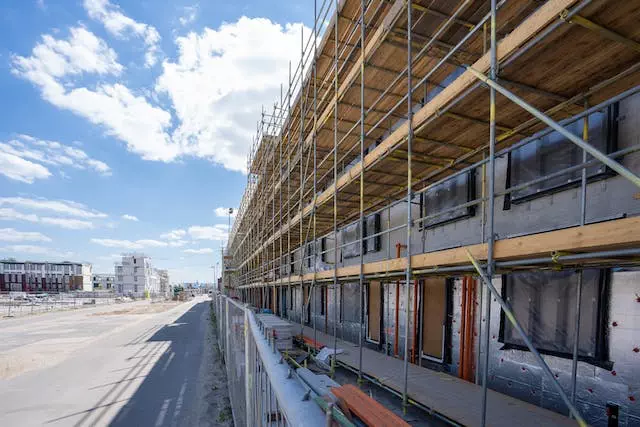Real Estate Lawyers Are Urging Presale Buyers To Exercise Caution Amidst A Wave Of Defaults
Real Estate Lawyers Are Urging Presale Buyers To Exercise Caution Amidst A Wave Of Defaults At a Glance
A man in British Columbia lost his $81,990 deposit on a townhouse despite having a contract option to transfer the deal to another buyer. Sudip Sehgall put down the deposit on the yet-to-be-built property in 2021 but was unable to sell his home in New Delhi to finance the deal due to new regulations and floods. When he tried to find a buyer to take over the Canadian deal, the developers opted to keep his deposit and sell the unit themselves. Sehgall is part of a growing number of Canadians defaulting on deals to buy presale or preconstruction condos or homes due to financial pressures, according to realtors.
Listen to this article:
A first-time homebuyer in Surrey, British Columbia, is facing the loss of an $81,990 deposit after the developer refused to allow him to assign the contract to another buyer. The Real Estate Development Marketing Act of B.C. allows developers to refuse assignment options and does not require them to deliver exactly what was seen in a showroom.
The contracts are one-sided and weighted in favour of developers, according to real estate lawyer Richard Pazder. The average home price in the area is predicted to drop by up to 10% in early 2024, leaving presale buyers vulnerable as their investment depreciates. The buyer has reached out to politicians and business leaders for help but has been advised that the contracts are ironclad.
The Details of Real Estate Lawyers Are Urging Presale Buyers To Exercise Caution Amidst A Wave Of Defaults
One B.C. male lost his $82K deposit, despite an agreement option to transfer to another purchaser.
In 2021, Sudip Sehgall paid $81,990 upfront for a townhouse that hasn’t been built yet in Surrey, B.C. While it was under construction, he sometimes checked out the site to see it grow.
The 52-year-old visualized the offer taking him steps closer to owning his first Canadian home, however, he only had enough for a deposit after a loan from his retired dad.
Sehgall was depending on offering his home in New Delhi to get funding to close the deal. He began to worry when new regulations in India made his home less desirable. After the floods happened, he wasn’t able to sell it anymore.
Making matters worse, when he searched for a purchaser to take over the Canadian deal so he might get a refund, the designers decided to keep his deposit and offer the brand-new unit themselves.
Sehgall, who came to Canada in 2016 as a skilled worker, says he is now broke and back to leasing, this time a cramped $1,700-a-month basement suite with his belongings lined up in suitcases against the walls. He lost his less expensive leasing, thinking he was about to move into his new home.
“I might have to go back to India, and my dreams of living in Canada have been totally ruined,” he told CBC News.
Sehgall belongs to a growing contingent of Canadians who are defaulting on deals to purchase presale or preconstruction apartments or homes due to monetary pressures.
Real estate agents suggest that the boost in defaults can be attributed to the mix of elevated rates of interest and decreasing condominium worths. Nationwide, realtors and real estate legal representatives observe that various purchasers are surrendering their deposits. Although Sehgall’s situation is exceptional, specialists claim that other Canadians are also encountering difficulties and discovering the prospective dangers connected with such deals. This issue is ending up being more prevalent.
In the past 30 years, Barry Lebow, a real estate broker in Toronto, has actually not experienced such a high variety of purchasers defaulting on their purchases.
Lebow specified that a considerable variety of individuals are experiencing this phenomenon, with various accounts emerging of people choosing to leave.
Buying presale or preconstructed homes indicates putting down a deposit and signing a contract that you will pay the balance after the residential or commercial property is built to agreed-upon specifications on a particular date, called the closing date.
Lebow states the decreasing apartment worths and high interest rates are making it difficult for individuals to fund and close deals. Sometimes the system has actually lost so much value they now can’t afford a home loan.
Financial institutions figure out loan quantities based on the existing market value of the residential or commercial property, so if the agreed-upon purchase cost is higher than the home’s present worth, the bank will just provide financing for the lower quantity. The purchaser needs to then create the staying funds separately.
According to Lebow, there was a similar wave like this in the ’90s.
Lebow helps designers in showing to their lending institutions that they have offered units at the greatest possible price, therefore reducing losses and optimizing profits. This is particularly essential when purchasers default and developers are accountable for reselling the systems. The process includes providing proof that the systems were noted at the highest cost and consequently resold at that rate. This helps designers to secure the required financing to total construction and cover closing costs.
Toronto condo legal expert Gerry Miller has observed that people tend to prefer purchasing concrete possessions. He has actually seen customers experience substantial monetary losses, approximately $300,000 in deposits, due to legal commitments that greatly favor the opposite celebration, describing them as elaborately constructed and weighted against the buyer to an extent he thinks about unreasonable.
Sehgall’s effort to offer his home on the borders of New Delhi was not successful due to an unforeseen event – the area got more rain in a single day than it had in the past four years, leading to prevalent flooding.
“It became very difficult,” he said. He says he called the designer and spoke repeatedly to Jennifer Wilson, vice president of sales for StreetSide Developments, requesting a refund of his deposit and looking for consent to have the deal assigned to purchasers he had actually found who were eager to take over the townhouse contract.
Sehgall said that the contract allows for an “assignment,” which means transferring the deal to a different buyer. The agreement specifically states that the builder cannot unreasonably refuse this transfer. Sehgall mentioned that there may be a fee for transferring the deal to another party, but he wouldn’t lose his entire deposit.
The developer was not willing to permit it, according to him.
Sehgall said, “They said no.” They have another presale going on near the area.
Vancouver realty lawyer Kenneth Pazder discusses that re-assignments may be seen as competition that might divert potential purchasers far from other homes the designer is selling.
According to Sehgall, he was allowed to extend his time and search for a co-owner, but despite his efforts, he was unable to discover a suitable solution.
“I pleaded with her, I sent desperate emails, I really didn’t want to stop paying,” said Sehgall. He explained that he begged and requested desperately, trying his best to avoid defaulting on his payments.
Agreements are ‘extremely one-sided’: legal representative
According to Pazder, it is occasionally feasible to get a refund on a deposit, generally including a charge ranging from one to 3 percent; however, the market is slow.
He said that presales are not selling as quickly as they usually do.
He said while the presale market is managed by the provincial federal government, contracts for presales or preconstructed units are not. He also said they can be sticky to work out, and the wording is weighted in favour of developers. Not only can the designer refuse to think about an “assignment” alternative, but it’s also not required to deliver exactly what the buyer saw in a display room.
According to Pazder, all these offers are very biased. Sometimes, you might be able to talk about the price and maybe they will give you an extra parking space or a storage room.
According to TD Bank’s projection in November, there may be a decrease of approximately 10% in typical home costs by early 2024 due to a boost in housing supply. This could leave presale buyers in a susceptible position as the worth of their financial investment possibly reduces.
Pazder stated he believes Sehgall has premises for a legal difficulty, arguing that the designer was “being unreasonable” in offering Sehgall’s claim that he had actually found another purchaser for the residential or commercial property.
Business decreases interview
CCBC News contacted the person selling the property in Sehgall’s case, but they declined to be interviewed. A representative from the company stated that their actions adhere to the guidelines stated in the Realty Development Marketing Act of B.C., as mentioned in an email.
Jonathan Meads, the vice-president of StreetSide Developments, which is a division of Qualico—an established company building projects in Western Canada—said, “This is a legal matter, and we have advised Mr. Sehgall to seek appropriate guidance from a lawyer.” He expressed that they would not provide any other comment.
Sehgall has actually contacted political leaders and leaders in the Surrey company community for help.
Sehgall has no experience in buying a house. Ha said, “I’m not someone who invests in properties. I didn’t have any idea, and my real estate agent didn’t advise me either. We just went ahead and signed the papers.”
“The agreements we signed are very strong. It’s extremely difficult if the home builder rejects you. Someone like me, who is buying a house, doesn’t have the legal or financial ability to fight against a big construction company.”
‘We have been messed up’
B.C. Real Estate Minister Ravi Kahlon told CBC News that Sehgall’s scenario was discouraging.
In a statement, Kahlon highlighted the significance of offering homebuyers the essential info to make well-thought-out decisions, as buying a home is often a major monetary choice for people.
“That’s why the Property Advancement Marketing Act makes it mandatory for developers to provide a document called a disclosure statement to buyers. It also gives buyers the right to cancel their purchase agreement within the first seven days. This helps customers get enough time to carefully think about their decision before moving forward with the purchase.”
Consumers can acquire information from the B.C. Financial Provider Authority to much better comprehend the procedure of presale purchases and their associated rights according to the act.
According to him, a waiting period of three days was executed in January 2015 to assist buyers in obtaining funding or arranging home examinations.
Sehgall is sorry for not getting better assistance. The $81,990 that was deposited was money that his family assisted in saving, and its loss had a profound impact, particularly on his elderly moms and dads.
“We have been destroyed,” said Sehgall.
He stated that my parents were really shocked and they still had hope that they would get their money back, even though it was a very slim chance.

Wrap Up
A man from British Columbia, Canada, lost his $81,990 deposit on a yet-to-be-built townhouse, despite having a contract option to transfer the deal to another buyer. Sudip Sehgall, who had put down the deposit in 2021, was relying on selling his property in New Delhi to finance the purchase. However, new regulations in India and subsequent floods made selling the property impossible. When Sehgall tried to find a buyer to take over the Canadian deal so he could get a refund, the developers opted to keep his deposit and sell the unit themselves. Sehgall’s case is part of a growing trend of Canadians defaulting on presale or preconstruction condo and home purchases due to financial pressures.
Experts attribute this trend to high-interest rates and declining condo values, which make it difficult for buyers to finance and close deals. Many buyers end up losing their deposits. Toronto real estate broker Barry Lebow notes that he hasn’t seen this many buyers defaulting in 30 years. The declining condo values and high-interest rates have made it challenging for buyers to obtain mortgages, as banks only loan money based on the current value of the property.
Sehgall claims that despite finding another buyer for the property, the developer refused to consider the assignment and refused to refund his deposit. The presale market is currently slow, making it difficult for buyers to sell their units. Real estate lawyer Tony Pazder explains that presale contracts heavily favor developers and are often one-sided. While deposits can sometimes be recovered with a penalty, the slow market and the surge in housing stock put presale buyers at risk of losing their investment.
Sehgall has sought help from politicians and business leaders but feels powerless against the developer. B.C. Housing Minister Ravi Kahlon expresses sympathy for Sehgall’s situation and emphasizes the importance of providing homebuyers with the information they need to make informed decisions. He highlights the government regulations in place to protect consumers in presale transactions and suggests seeking advice from the B.C. Financial Services Authority. Sehgall regrets not receiving better advice and describes the loss of his deposit as devastating, particularly for his elderly parents who had contributed to the savings.














